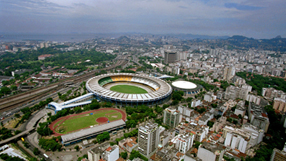
The best features, fun and footballing quizzes, straight to your inbox every week.
You are now subscribed
Your newsletter sign-up was successful
Want to add more newsletters?

Five times a week
FourFourTwo Daily
Fantastic football content straight to your inbox! From the latest transfer news, quizzes, videos, features and interviews with the biggest names in the game, plus lots more.

Once a week
...And it’s LIVE!
Sign up to our FREE live football newsletter, tracking all of the biggest games available to watch on the device of your choice. Never miss a kick-off!
Join the club
Get full access to premium articles, exclusive features and a growing list of member rewards.
Rio de Janeiro was confirmed as the venue for the final and Sao Paulo was awarded the opening match featuring Brazil, even though it has barely started work on its Itaquerao stadium.
Sao Paulo and Belo Horizonte will stage the semi-finals and the capital Brasilia will get the third-place play-off after the match schedule was announced at a brief, televised ceremony at the headquarters of world governing body FIFA on Thursday.
Matches will kick off at 16:00, 19:00 and 22:00 GMT.
The surprise was that organisers decided against basing teams in single venues, which means some must travel thousands of kilometres between matches in one of the world's biggest countries.
It had been expected teams would play their group matches in two venues at most to cut down travelling in a country over-dependant on air transport which is limited and unreliable.
"The teams will travel around the country so that not just the biggest cities get the best teams," said Ricardo Teixeira, president of the local organising committee and Brazilian FA.
The team eventually drawn as number two in Group A will have to play in Sao Paulo in the South-east, then travel to Manaus, a three-and-a-half-hour flight away, and finally Recife.
The best features, fun and footballing quizzes, straight to your inbox every week.
Flights between Manaus and Recife nearly always involve a connection, taking a total of six to nine hours.
The road journey is 5,700-km long according to Brazil's transport department.
The team drawn as number four in Group D might have to play their first game in Cuiaba, where temperatures in June can top 30 Celsius, and their second in Porto Alegre, where temperatures can drop to near freezing.
"It's a big task and a long job, we had 57 versions of the match schedule," said FIFA Secretary General Jerome Valcke.
"We took into account medical factors, logistics, travel and accommodation."
Many other teams face at least one long flight in their schedules while fans may struggle to get on a plane at all due to the limited supply of seats.
Brazilian authorities have already admitted the country's outdated airports are the biggest worry facing the tournament.
Sao Paulo, Brazil's largest city, was in danger of missing out on the tournament last year after its original venue, the Morumbi, was ruled out because local authorities could not provide financial guarantees for the stadium reform.
It was then decided to use the new Itaquerao stadium being planned by Corinthians though work on that only started in June.
 Join The Club
Join The Club










